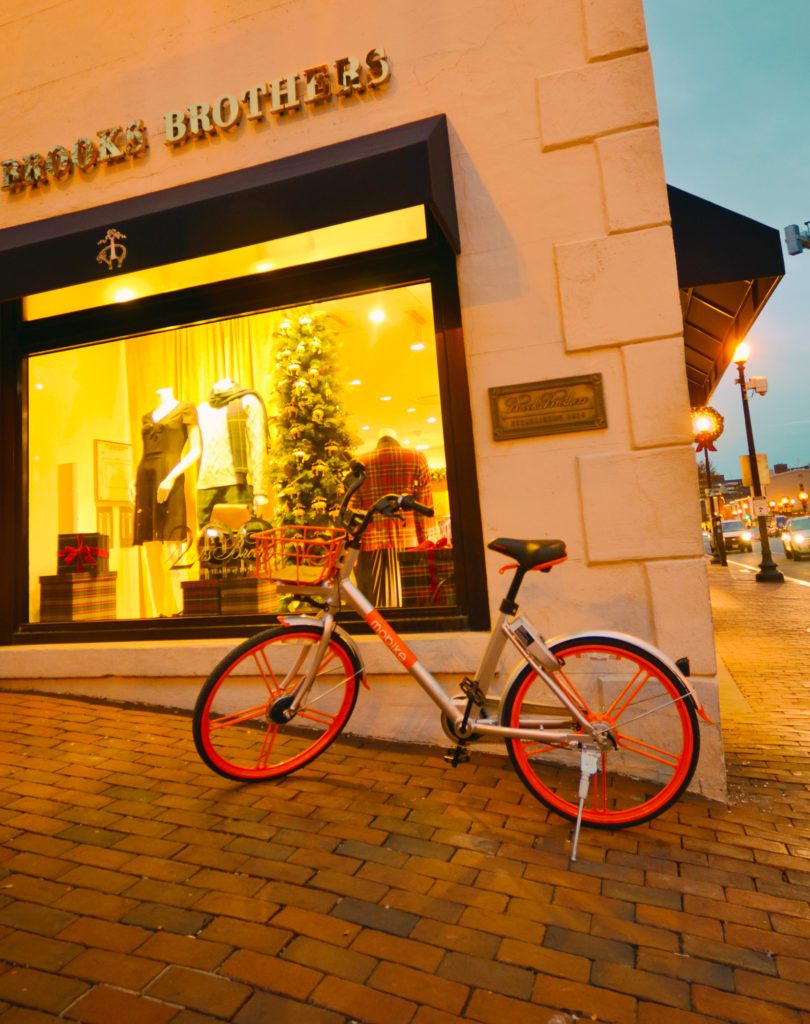Dockless Shared Bikes Surge in Georgetown
By • December 18, 2017 0 781

Bike enthusiasts, concerned citizens and advisory neighborhood commissioners from Foggy Bottom and Georgetown packed the meeting room of Francis-Stevens School on N Street NW on Dec. 5 to discuss the newest transportation mode in Georgetown: dockless shared bikes.
The bikes come in all colors: lime green, yellow, blue, neon red and rust orange. They are not to be confused with those provided by the city’s Capital Bikeshare program — solid orange bikes that need to be picked up and returned to docking stations.
A dream come true for commuters who want a bicycle immediately and close to (if not in front of) their homes or workplaces, the inexpensive dockless bikes can be left right at a rider’s destination. Everything is paid for, located, unlocked and locked via smartphone apps that are free for users to download. Riders have none of the worries or responsibilities of ownership, such as registration, insurance, maintenance and disposal. You just find the nearest bike, ride it and leave it.
Since June, five companies have set up dockless shared bicycle businesses in D.C.: Lime Bike, Mobike, Ofo, Spin and Jump, which also offers semi-electric-powered bikes. The operating technology, utilizing GPS and electronic payment systems, was developed in China. The procedures are printed on each bike. Prices start at $1 an hour.
All the programs have preliminary operating agreements with the District Department of Transportation. During the pilot period through February, no company is allowed to expand beyond 400 bicycles in the District, although all have plans and capacity for hundreds, if not thousands, more.
That’s why none of the company managers seemed to view the competition with alarm. “We are all here to find the best way to operate in the area. We can all share up to a point to make this whole thing work,” said DDOT’s Sam Zimbabwe at the packed town meeting. Right now, all are serving a growing demand.
But there are issues of concern. During the meeting, residents told stories of bikes parked in front of driveways, entry gates and parking spaces. The GPS systems on the bikes can pinpoint where the bike is, but cannot indicate if it has fallen down on its side or is blocking a passageway. Spokespersons for several of the companies responded that all the bikes have phone numbers on them; if called, they will deal with problem bikes as soon as possible.
Another issue is quality. “I picked up one bike, moved it from my entrance and it fell apart,” said a woman from Dupont Circle. “It’s all right. I know how to fix bikes, so I fixed it. But it’s certainly a cheap bike.” Some of the companies are prioritizing an inexpensive ride over durability, apparently.
Stashing is another concern. The GPS systems can usually determine if a client is hiding a bike to have it handy for the next use.
To date, all the companies use credit-card-based payment systems. What about people who don’t have them? Some companies are looking at stores (7-Elevens? Starbucks?) or agencies that could process cash transactions.
The young dockless bike operations clearly are works in progress, eager for feedback and on-the-ground information, seeking to establish best practices. There are lots of proponents and some opponents. Expect to see increasing numbers of the colorful bikes around Georgetown.

